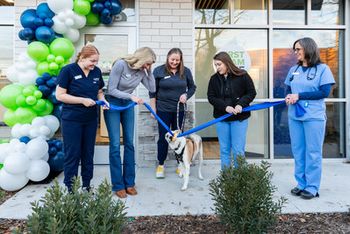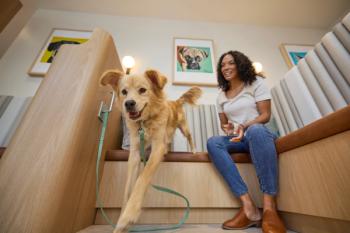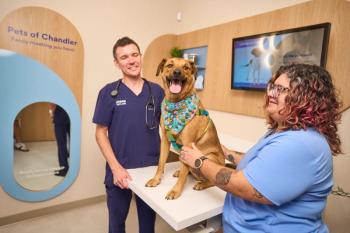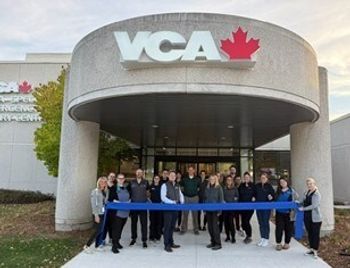
To Groom or Not to Groom
With use of ancillary services on the rise, these additions could really help your practice shine.
Boarding can include some fun in the sun. Photo courtesy of Carolina Ranch Animal Hospital & ResortThere's a trend we've seen recently in talking with clients: more and more people are considering including ancillary services in their current hospital or as part of the build-out of a new hospital. This isn't a new idea by any means, but recently it's coming up more often.
Many of our clients believe they've reached a plateau in terms of business growth. Things grew substantially as we recovered from the recession, but have begun to level out. Business is good, but no longer growing at a rapid pace. Perhaps veterinarians are looking for other ways to generate more income and continue their growth? Or maybe it has to do with all the baby boomers on the verge of retirement? Perhaps they are looking for ways to make their businesses more profitable and more enticing to potential buyers as the last piece to their exit strategy?
Regardless of the reasons for considering adding any of these services, it's important to have an idea of the pros and cons before deciding whether to make any of them a part of your veterinary practice. Here are some of the most popular options.
Boarding
An indoor pet camp could be your clinic's cherry on top. Photo courtesy of McGregor Boulevard Veterinary ClinicOffering boarding services can provide many benefits for veterinary practices, including:
· Providing an additional profit center.
· Providing income during times when veterinary service revenues drop, such as during summer vacation.
· Reinforcing the veterinary practice by offering medical or specialized care for boarded pets, services that veterinary clients need and value.
Welcome to the jungle! Adding color to your clinic can boost your look. Photo courtesy of Carolina Ranch Animal Hospital & Resort. While all of this sounds promising, there's a lot that goes into making it a part of your practice. It requires capital expenditure, expertise and likely some additional staffing and extra marketing efforts to get the word out.
From an economic standpoint, it's important to have a good picture of investment versus return before committing to including boarding as part of your business. For example, how many animals do you want to board, or can you board and how much will it cost? You also want to consider what options for boarding already exist within your community and whether or not there is additional need.
Bright open spaces with plenty of natural light make this resort worth a tail wag. Photo courtesy of Carolina Ranch Animal Hospital & Resort. Lastly, if you're considering adding boarding, realistically you need to go (kinda) big or go home. Considering the amount of effort and capital needed to add eight to 10 kennels to your practice, this isn't going to have a big enough return on investment to make it worthwhile for you. Boarding spaces are not cheap to construct. They require a significant financial investment in order to accommodate proper HVAC design, durable materials and finishes, and the costs of caging, runs and other associated equipment.
With this in mind, there are two important questions to consider: Do you have the square footage to spare or will you need to take space away from your primary veterinary services? And, do you have adequate funding to build a boarding facility that will be profitable on its own? If the answer to this second question is no, the next question to ask yourself is, will the boarding services bring other benefits to the practice, such as client loyalty, growth in other services or an enhanced community presence?
"You make bath time so much fun!" Photo courtesy of the Pet Wellness Center. Grooming
Another area that could potentially help generate additional revenue as an ancillary service is grooming. There are two main ways in which to add grooming to your hospital.
1. Hire a full-time, on-staff groomer.
2. Provide the physical grooming space within your building and then lease it out to an established groomer.
There are pros and cons to either approach and a risk to either approach as well. With an on-staff groomer, you can control profit margins more effectively as the service will be an integral function of your hospital. But if the grooming services fail to take off, you're stuck paying a salary to a groomer who's not consistently busy. In contrast, with the lease option, the groomer is responsible for their own fate, based on the amount of work they bring in. However, you are bound to a landlord-leasee relationship which has its own risks and potential shortcomings.
Stylish and (most importantly!) efficient. Photo courtesy of McGregor Boulevard Veterinary Clinic.
DIY bathing
This is probably the least common of the ancillary services that gets incorporated into a veterinary hospital. DIY bathing doesn't generate quite as much revenue as the other services listed above, but it is generally the easiest to maintain. There are lots of new bathing units out there now, like this one from
Again, you have to be keen to the needs and desires of your community, and you will definitely need to market this service. It might take some time to recoup your initial investment since revenue comes in very small chunks with each use, but once you do, everything thereafter is almost pure profit as there are very few overhead costs to maintain this service.
All in all, the addition of ancillary services to your hospital is something worth consideration. What client wouldn't want the security of knowing their own veterinarian is on site to help with the care of their pet while its being boarded or groomed? But before you embark down that path, make sure to do your due diligence and develop a business plan so you have a clear picture of the need for these services, who your clientele will be and if the return on investment is worth it for you.
Ashley Shoults, AIA, is a partner at Animal Arts in Boulder, Colorado.
Newsletter
From exam room tips to practice management insights, get trusted veterinary news delivered straight to your inbox—subscribe to dvm360.




